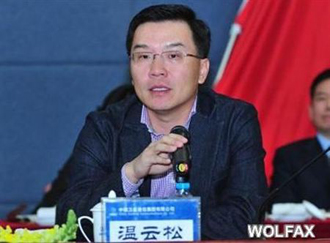The children of China’s top bosses are being groomed for choice posts in both the political and business worlds, according to the New Delhi-based Institute for Defense Studies and Analyses.
China President Hu Jintao has a son, Hu Haifeng, who is party secretary of Qing Hua Holdings, a state-owned company that controls a number of large tech firms. Hu Haifeng was CEO of Qing Hua in 2007 when Nutech, one of its subsidiaries, secured a $55.3 million contract to sell security X-ray scanners to the government of Namibia. In 2009 about $2 mil. of about $13 mil. initially paid by the Namibian government appeared to have been kicked back to a Namibian official, presumably as a bribe for the contract. This information fueled a brief scandal in overseas media because of the link between Qing Hua’s CEO and China’s President and the fact that Hu Jintao had traveled to Namibia to offer aid, part of which was used to fund the purchase of Nutech scanners.
The scandal was blacked out in media inside China. But as corruption scandals go, it was deemed minor relative to the far more blatant forms of coruption that many have come to expect among China’s high-ranking officials. By the time the scandal broke Haifeng had already been promoted to party secretary of Qing Hua Holdings, providing some distance. He was never named as a suspect in the case though he was interviewed as a witness.
Premier Wen Jiabao too has a son, Wen Yunsong (aka Winston Wen), who has used his family connection skillfully. He graduated from Northwestern University with an MBA. In 2005 he started up New Horizon Capital, a private equity fund, and had $500 million under management by 2007. His clients have included billionaire Masayoshi Son, founder of Japan’s Softbank, and Singapore’s state investment fund Temasek Holdings, which helped Wen launch a $1 billion fund in 2010. He also became CEO of telecom equipment maker Unihub Global Networks. More recently Wen was appointed chairman of China Satellite Communications. There is little evidence of any direct efforts by his father to help Winston’s business career, but the son has been criticized for having exploited his family connection.
Bo Xiyong, brother of the recently disgraced Chongqing party boss Bo Xilai, is executive director of state-run banking firm China Everbright Holdings. Operating under the alias Li Xueming, Bo’s brother receives an annual salary of around $1.7 million.
Powerful parents are passing their power down in the political arena as well. In 2005 children of leading revolutionary leaders — known as “princelings” — held three of the 25 seats on the Politburo. The number had grown to seven by 2007. It’s expected to grow again during the transition to take place beginning in December of this year, though Bo Xilai — son of Bo Yibo — has been dropped from the Politburo rather than being elevated to the even more powerful 9-member Standing Committee of the Politburo. However, the post of China’s president will be transferred at that time to Xi Jinping, second son of Xi Zhongxun, a founder of the Communist guerrilla movement in Shaanxi Province and a former Vice-Premier.
It has become de rigeuer for top party officials to prepare their offspring for high posts by sending them to study in the United States or Great Britain. For example, both Bo Xilai’s son Bo Guagua, Xi Mingze, daughter of Xi Jinping, and Chen Xiaodan, grand-daughter of a revolutionary hero Chen Yun, study at Harvard (though Bo Guagua’s status there is currently unknown in the wake of the his parents’ scandal).
Such princelings make up a large share of the over 150,000 Chinese students currently studying in the United States. Their lifestyles while overseas are generally far more luxurious than could be afforded by the modest salaries paid China’s party or government officials.


